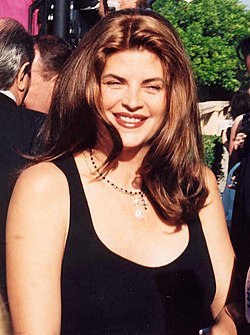Storylines
We thought of the part as a martinet, a bitch. Then we met [Alley] and there was this vulnerability, so we made her the neurotic woman of the [1980s]. [2]
— James Burrows
When she first meets bartender and ladies' man Sam Malone (Ted Danson), Rebecca's reaction to him is negative. Sam often tries to seduce her; in her first couple (or few) years at Cheers she always rejects his advances. [3] In the sixth season (her debut season), Rebecca has a crush on her boss, Evan Drake (Tom Skerritt). Throughout the season she tries unsuccessfully to make Evan notice her until, toward the end of the season, Evan departs for Japan and is found to have a lover, so Rebecca is forced to let him go. In the seventh season, after Evan's departure, his replacement fires Rebecca and promotes Sam to manager. Rebecca does occasional waitressing and eventually gets her job back. In the eighth season, she dates millionaire Robin Colcord (Roger Rees), but Sam discovers that he intends to secretly retrieve information from Rebecca's computer to facilitate a corporate takeover, leading to their breakup. Rebecca finally falls for Sam after he saves her from Robin's scheme, and after three years of suppressed attraction the two have sex in the Cheers office, leaving it wrecked. Rebecca later confessed to Sam it was one of the most powerful moments in her life. However, the affair is short-lived because Sam becomes complacent about it.
In the ninth season, Robin—now a wanted white-collar criminal—surrenders himself to the police and confesses his love for Rebecca. Meanwhile, Sam recovers his ownership of the bar just after the Lillian Corporation fires Rebecca. Sam rehires her as manager. Robin proposes matrimony to Rebecca after he is released from jail, and she accepts. In "The Days of Wine and Neuroses" (1991), Rebecca becomes drunk and confesses that she is questioning her feelings for Robin now that he has lost much of his fortune. In the following episode "Wedding Bell Blues" (1991), Rebecca jilts Robin at their wedding and tells him, "I only loved you for your money!" Robin leaves her, retrieving a stash of $6 million hidden in the bar office under Rebecca's desk. Later in the season, Rebecca decides to buy Cheers for herself after John Allen Hill becomes the new owner of the restaurant upstairs. John also owns the bar's back room. Using money from her father, Rebecca helps Sam buy the back room of Cheers, and the two co-own the bar.
During the first half of the tenth season, Sam and Rebecca try to conceive a child, but they realize they have no feelings for each other and then decide to stay friends (the arc was originally to write in Alley's pregnancy, but was scrapped when she miscarried). Towards the end of the show, Rebecca does little work, often mentioned by Carla Tortelli (Rhea Perlman). In the eleventh and final season, Rebecca's cigarette causes an enormous fire at Cheers, and she remorsefully uses her life savings to repair the bar. In "Look Before You Sleep" (1993), she is revealed to be the building superintendent of her apartment complex. In the penultimate episode "The Guy Can't Help It" (1993), Rebecca initially rejects the advances of plumber Don Santry (Tom Berenger), but Frasier orders her to give Don another chance. For weeks Rebecca and Don date each other. Sam tries to convince her that she is making a big mistake with Don. In the series finale, she marries Don and resigns from Cheers to devote more time to her husband and to start a family. At first she regrets the marriage, but when Don later works for the Boston sewer department, she becomes happier with it.
Alley appeared as Rebecca briefly in a fourth-season episode of Wings titled "I Love Brian". In the episode of the Cheers spin-off series Frasier called "The Show Where Sam Shows Up", Sam visits Frasier and tells him that Don left Rebecca after he made a fortune on a plumbing-related invention, and Rebecca was "back at the bar". When Frasier asks whether Sam means she is working at Cheers again, Sam replies, "No, she's just back at the bar." Alley opted not to appear on an episode of Frasier due to the sitcom being centered on two psychiatrists, which conflicted with her Scientology beliefs. [4]

